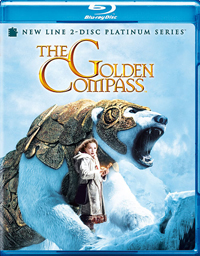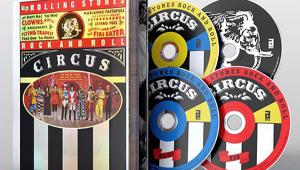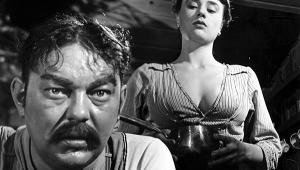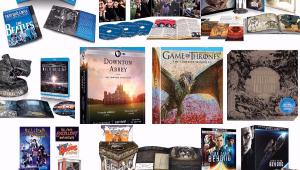The Golden Compass
 Imagine a parallel universe that is familiar yet strange, where human souls reside not in the body, but in accompanying animal spirits called daemons. A young girl, Lyra Belacqua (Dakota Blue Richards), gains possession of the coveted Golden Compass—the last example of a mystical, powerful device also known as an alethiometer that can unveil the truth, reveal what others wish to hide, and even see into the future. In order to save her best friend after he is abducted by the Gobblers, a sinister group secretly headed by Mrs. Coulter (Nicole Kidman), she must travel to the frozen tundra of the North with help from the clans, Gyptians, and an armored bear.
Imagine a parallel universe that is familiar yet strange, where human souls reside not in the body, but in accompanying animal spirits called daemons. A young girl, Lyra Belacqua (Dakota Blue Richards), gains possession of the coveted Golden Compass—the last example of a mystical, powerful device also known as an alethiometer that can unveil the truth, reveal what others wish to hide, and even see into the future. In order to save her best friend after he is abducted by the Gobblers, a sinister group secretly headed by Mrs. Coulter (Nicole Kidman), she must travel to the frozen tundra of the North with help from the clans, Gyptians, and an armored bear.
The Golden Compass was adapted from the first book in Philip Pullman's fantasy trilogy, His Dark Materials, which was published in 1995. Although not as popular as the soon-to-follow Harry Potter saga, it met with similar controversy from religious groups. Pullman is a devout atheist, although I never found the books to preach this philosophy in the slightest degree. He does seem to have an issue with organized religion, and the evil "Magisterium" portrayed in the book is very similar to our Catholic Church.
Unfortunately, this film will likely go down in history as the one that sunk New Line Cinema. In order to pay for its $180 million budget, the studio sold the overseas-distribution rights. The American box-office take barely topped $70 million, yet it raked in over $200 million abroad. Warner has since absorbed New Line under its umbrella to avoid mortgaging the overseas box-office receipts, and I hope that means we will see the trilogy completed.
Taken on its own, The Golden Compass is just an average film. Much like the first act in a play, this chapter of the trilogy sets up the rest of the story, and the screenwriter, Chris Weitz, did his best to have it stand on its own. But the other two chapters are needed for the story to make sense, and its rather short run time of 113 minutes causes the movie to feel rushed; the character development leaves a lot to be desired as well. The book ends in a cliffhanger, much like The Fellowship of the Ring, but the movie's ending adds a conclusion to the first chapter, leaving fans of the books angry and moviegoers confused.
At first glance, this is a well-done AVC encode. The print is in pristine condition, but it's almost too clean and sterile. The film was shot using both 35mm and HD cameras, so creating a consistent look left two choices—remove the grain from the film or add grain to the HD shots. The studio chose to remove most of the grain, hurting fine detail. Flesh tones have little texture, and the image is flat and somewhat soft, especially when the CGI effects are prominent. Color saturation is excellent and the black levels approach inky, but they fall just short of reference-quality.
I recently installed a Panasonic DMP-BD30 Blu-ray player, so I was able to send the DTS-HD Master Audio 7.1-channel soundtrack as a bitstream to the AVR. The audio is reference-quality, with phenomenal clarity and imaging. Discrete sounds encompass the room from every angle, and the musical score by Alexandre Desplat shows off a full-bodied midrange and superb dynamics.
In order to provide the plethora of high-definition bonus features, the package includes two BD50 discs. Disc one holds the movie along with a director's commentary. Additionally, there is a picture-in-picture commentary with scene-specific talking points, a feature that can only be viewed with a Profile 1.1 or 2.0 player. The second disc offers over two hours of content that includes the origins of the story, behind-the-scenes featurettes, and some material dealing with the world in which Lyra lives. I found the bonus features more enjoyable than the actual film, especially the interview with Philip Pullman.
If you aren't familiar with the books, I'm sure you will enjoy the film more than I did. Because I know the books, anything less than a faithful representation is bound to be a disappointment. Still, the presentation on Blu-ray is stellar, especially the reference-quality DTS-HD Master Audio soundtrack and the revealing bonus features.
Release Date: April 29, 2008
Film: 6 out of 10
Picture: 8 out of 10
Sound: 10 out of 10
Review System
Source
Panasonic DMP-BD30
Display
JVC DLA-RS1 projector
Stewart FireHawk screen (76.5" wide, 16:9)
Electronics
Yamaha RX-Z11 AVR
Belkin PF60 power conditioner
Speakers
M&K S-150s (L, C, R)
M&K SS-150s (LS, RS, SBL, SBR)
SVS PC-Ultra subwoofer
Cables
Monoprice HDMI cables (source to pre/pro)
Best Deal analog-audio cables
PureLink HDC Fiber Optic HDMI Cable System (15 meters) from pre/pro to projector
- Log in or register to post comments






























































